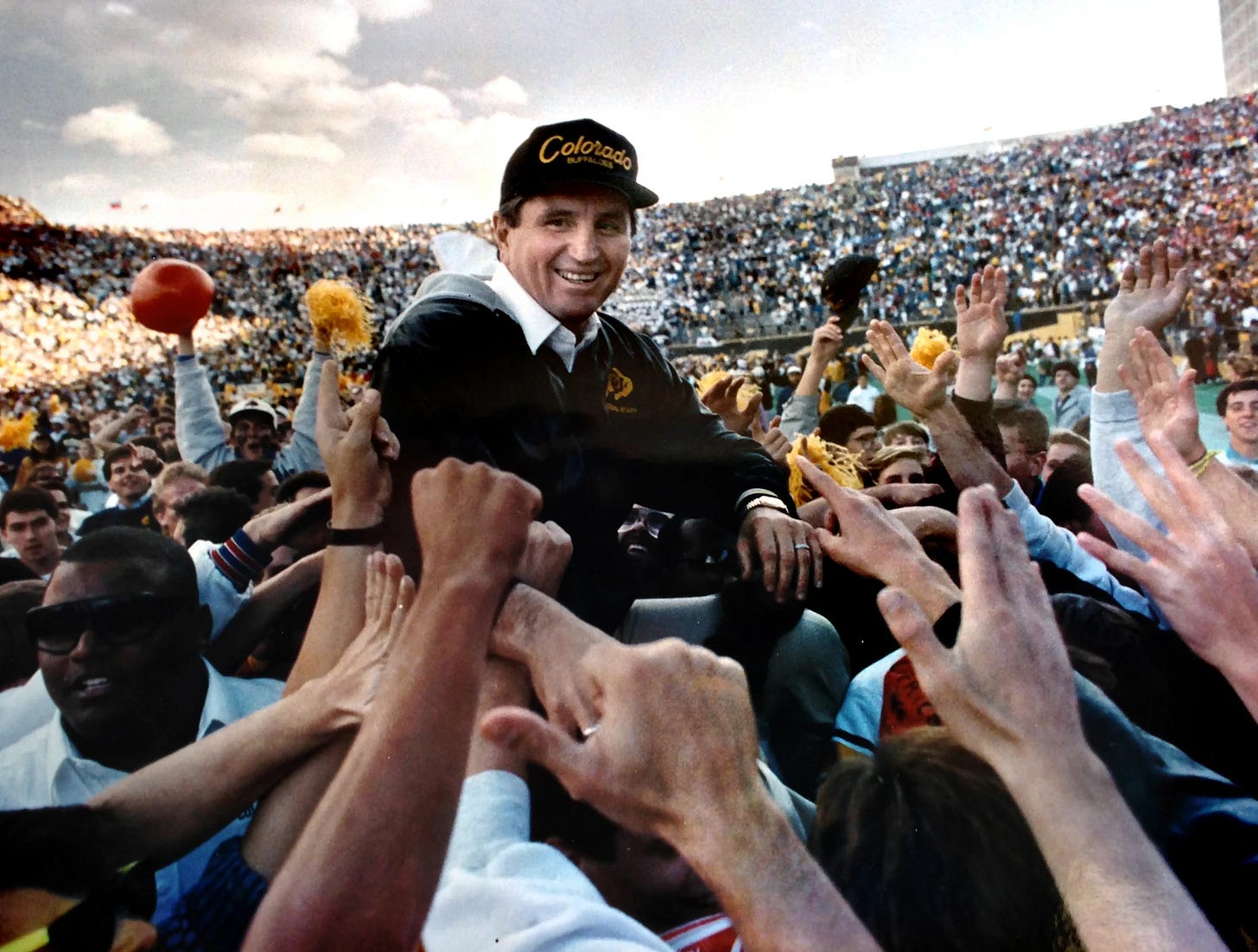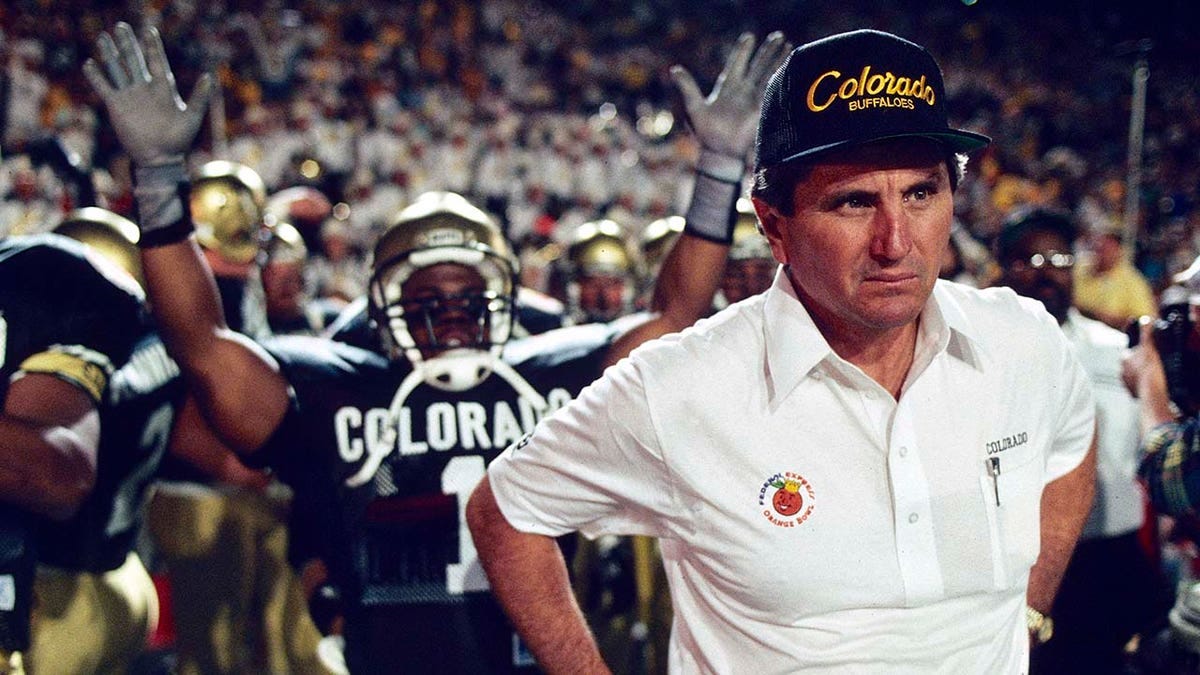Bill McCartney's complex life
The legendary Colorado football coach died last week. He leaves behind a legacy that isn't always easy to explain or fully understand
I hate that I’m doing this.
First and foremost, it’s because someone died – in this case, former Colorado football coach Bill McCartney – and leaves behind an untold number of grieving family members, friends, former players and fans. More selfishly, though, I don’t want this newsletter, which I started to cover all manner of subjects I find interesting in the world of college sports, to simply be a place that writes about a famous coach any time they pass away.
But when it comes to McCartney, I don’t really have much of a choice.
The college football legend died last Friday at 84 years old, nearly a decade after he was diagnosed with dementia. McCartney is probably one of the more underrated figures among championship-winning coaches, having turned a Colorado program that was nothing before his arrival into an unlikely national power that won the Buffaloes’ first and only national championship in 1990.
“Coach Mac touched countless lives with his unwavering faith, boundless compassion, and enduring legacy as a leader, mentor and advocate for family, community and faith,” his family said in a statement after his death. “As a trailblazer and visionary, his impact was felt both on and off the field, and his spirit will forever remain in the hearts of those he inspired.”
As the statement indicated, McCartney did more than win games.
His teams, for all they achieved on the field, courted controversy away from it. The line between McCartney’s professional and personal lives was often blurred. His unrelenting devotion to his faith made him one of the most prominent figures in the American Evangelical movement in the 1990s and into the 2000s.
In all, it made him one of the most fascinating people to ever roam a college sideline in any sport.
Bill McCartney the coach
Above all else, McCartney was an outstanding coach, likely among the best in the sport’s 155-year history.
Thirty years after coaching his final game, McCartney is the winningest coach in Colorado history, with a 93-55-5 record to his name. He led the program to 10 consecutive winning seasons, another school record. In 2013, he was inducted into the College Football Hall of Fame.
It’s a career crescendo that came with humble beginnings.
He got his start in the high school ranks. In 1973, he became the first high school coach ever in his native Michigan to lead football and basketball teams to the state championship in the same season, doing so at Divine Child High School in Dearborn.
Becoming that kind of historical oddity caught the eye of folks in power at Michigan – namely, football coach Bo Schembecler and men’s basketball coach Johnny Orr, both of whom wanted him to join their respective staffs as an assistant. His wife told him to follow his heart and so he did, opting to become an assistant for Schembechler and his powerhouse Wolverines football program.
After three seasons as the defensive ends coach, he worked his way up to defensive coordinator and in that role helped lead Michigan to three Big Ten championships in a five-year stretch.
In 1982, the job that would come to define his life opened when Chuck Fairbanks abruptly left Colorado in June, only about three months before the start of the season, for the New Jersey Generals of the upstart United States Football League.
Buoyed by Schembechler’s personal recommendation, McCartney got the position, but the task that awaited him in Boulder was taxing. The Buffs had cratered under Fairbanks, going 7-26 over his three seasons there. It took McCartney quite a bit of time to climb out of that hole. He won just seven games in his first three seasons, an underwhelming run capped off by a 1-10 mark in 1984.
Though he managed to keep his job, something that almost certainly wouldn’t happen today, he knew something had to change. Heading into the 1985 season, he made the unconventional decision to switch to the wishbone offense, with a fullback right behind the quarterback and a running back on either side behind the fullback. It helped save his tenure and eventually brought Colorado to heights it had never previously enjoyed, even for a program sitting 5,430 feet above sea level.
After starting 4-16-1 in Big Eight Conference games under McCartney, the Buffs went 54-13-3 in league play over his final 10 seasons. Beginning in 1989, what had been a formidable regional force became a national one. Colorado had an undefeated regular season, toppled Nebraska and Oklahoma for the conference title, peaked at No. 1 in the Associated Press poll and McCartney won virtually every coach of the year award there was. It fell just short of a national championship, though, losing to Notre Dame 21-6 in the Orange Bowl.
It got revenge the following year in the same stadium, defeating the Fighting Irish 10-9 in the Orange Bowl to finish 10-1-1. It was crowned the national champion by four different organizations, with only United Press International, which had Georgia Tech atop its poll, preventing it from being an outright title-holder.
The success of McCartney’s teams was no fluke.
His staffs were routinely loaded with future head coaches, with assistants like Gary Barnett, Rick Neuheisel, Jim Caldwell, Ron Dickerson, Gerry DiNardo, Karl Dorrell, Jon Embree, Les Miles, Bob Simmons, Lou Tepper and Ron Vanderlinden passing through Boulder during McCartney’s tenure. In three of his final six seasons, one of his players finished among the top five vote-getters for the Heisman Trophy, with the late Rashaan Salaam winning it in 1994. Through diligent player development and his personal recruiting prowess, McCartney turned Colorado into an NFL pipeline. During the 1998 NFL season, only Notre Dame and Florida State had more former players in the league than the Buffs.
Over what would be his final six seasons, from 1989-94, Colorado went 58-11-4, the fifth-best record in the nation behind Miami (63-9), Florida State (64-9-1), Nebraska (61-11-1) and Alabama (62-12-1). The Buffs’ 36-3-3 record in the conference games during that same stretch was the best in the sport. In each of those six seasons, they finished in the top 20 nationally, including in the top 10 three times.
He not only built a behemoth, but he did so at an unlikely place, one that didn’t win big before he got there and rarely has since he left. McCartney is an outlier in Colorado’s broader football history. Not only is his national championship the program’s only one, but McCartney is responsible for the Buffs’ three 11-win seasons. Of Colorado’s five 10-win seasons, two came in the two years immediately after McCartney stepped down.
The price of glory
Colorado’s ascent to college football royalty in the late 1980s and early 1990s didn’t come without some of the trappings that can often swallow a program trying to make it to the sport’s pinnacle.
Keep reading with a 7-day free trial
Subscribe to The Front Porch to keep reading this post and get 7 days of free access to the full post archives.



